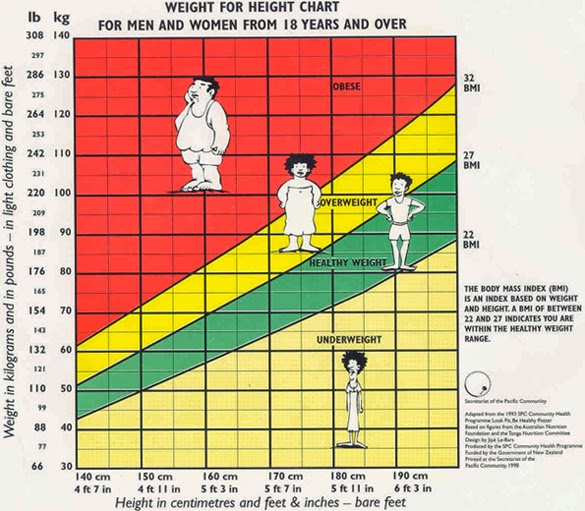Many people are under the impression that being overweight means that they are on a path to obesity; this is a false conception. In fact, overweight has a whole different meaning than obesity, and it is a common mistake to confuse the two. Overweight and obesity are terms that one can hear from health care providers, news, friends and family; these words are so often used in casual conversation they have lost their meaning. Another common word that most adults are aware of is BMI; Body Mass Index. This is a term simply meaning weight to height ratio. It is commonly read on a chart (see below) like this one.
BMI Categories:
- Underweight = <18.5
- Normal weight = 18.5–24.9
- Overweight = 25–29.9
- Obesity = BMI of 30 or greater
One can calculate BMI by using
the following formula...
Use either of these formulas for
U.S. units, depending on how the measurements were made: BMI = weight in lbs. multiplied by 703, then divided by height in inches squared; or BMI = weight in lbs. times
4.88 divided by height in feet squared. Here is an example for a person
weighing 172 lbs. and who is 6 feet 1 inch tall: BMI = (172 X 703) ÷ (73 X 73)
= 120916 ÷ 5329 = 22.7 rounded to a single decimal. (http://www.ehow.com/how_4529984_calculate-bmi.html)
There are also BMI calculators
that you can use if you are not comfortable with these formulas. Here is
just one of many websites to use http://www.nhlbisupport.com/bmi/ and there
are also phone apps available for downloading.
Now that you know what BMI
is, how to calculate BMI, and have seen a chart to place yourself in,
let us discuss the meaning or significance of these words.
Are your overweight?
What is overweight? Being overweight isn't always negative;
however, that doesn't mean that you shouldn't still watch your diet and
exercise.
Overweight does not necessarily mean unhealthy; there are four components that make up a person's weight.
1. Water
2. Bone
3. Fat
4. LBM - Lean Body Mass
This
includes skin, muscles, hair... any tissue not mentioned above.
If you were to hold 1lb of muscle in
one hand and 1lb of fat in the other, the fat would be much larger. Fat
is much bulkier than LBM.
The only one of the four to
worry about in "unhealthy" terms is "FAT."
Water, bone and LBM each weigh more than fat, so a person with an
"overweight" BMI could be quite fit; consequently, their weight would
be higher in regards to their height; athletes commonly have higher BMI's for
this reason. Because of this, the term overweight isn't as bad as
what people perceive it to be.
Obesity on the other-hand is unhealthy
because any BMI over 30 is unsafe in the fact that with that ratio,
there will be more fat in the equation.
With this new knowledge it is safe
to say that it is more important to lose fat than lose weight! In order to
measure progress of fat loss, one needs to measure the circumferences of their
body; the arms, thighs, waist, chest, or anywhere they prefer. Continue
to measure throughout the diet and exercise program. Because we know that
fat is more bulky than muscle, when we lose inches, we know that we are losing
fat. People get excited when they lose weight; however, this could mean that
they are losing water or LBM, not fat. When a person is
getting HEALTHY, they may gain some weight because they are losing fat and
gaining Lean Body Mass.

No comments:
Post a Comment